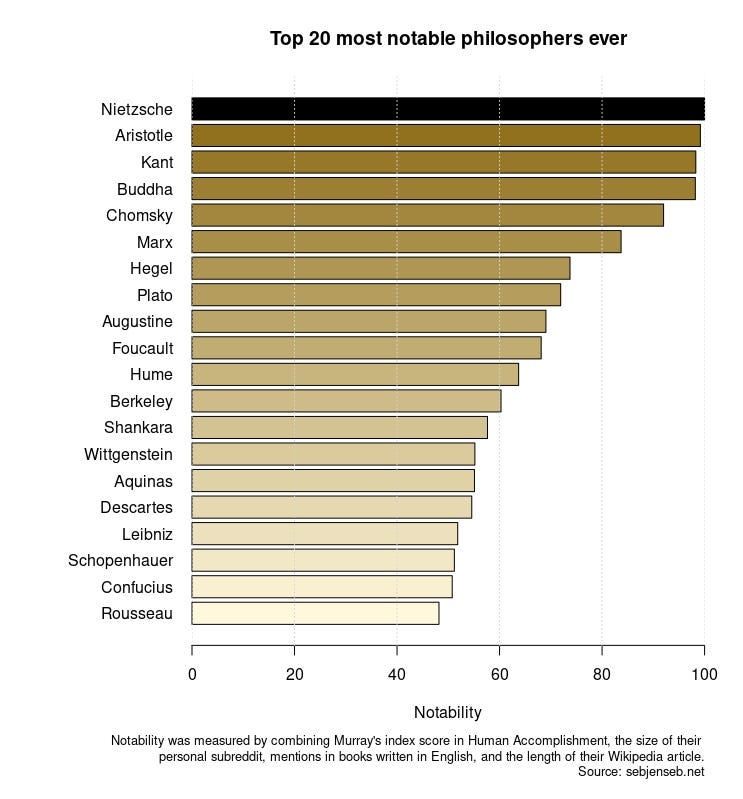I recently posted a rank of several philosophers in a composite of various indicators of notability.
It got quite a bit of pushback towards the list, mainly for three things:
The use of subreddit sizes as an indicator of notability.
Chomsky’s high rank on the list.
The use of the length of the wikipedia articles
Looking back, I should have removed Chomsky because he is not a philosopher any more than Jordan Peterson is. The philosophy and linguistic work he did was important earlier in his career, but what caused him to gain his following was his political commentary; the academic work was largely used as a credentialing mechanism for his political commentary. In terms of notability on the internet, he’s comparable to Hegel, who’s inclusion nobody questioned.
The two other decisions I made (using subreddit sizes and wikipedia article lengths) are defensible. In fact they compare well to the index scores and the mentions in the English corpus in terms of internal consistency.
Though anybody who was critical of their inclusion already was able to see this, so evidently it did not convince them. Therefore, allow me to make a more theoretical case for including them.
Hegel and Kant have philosophy subreddits. Me and my dad do not. In fact, many of the 40 philosophers who I considered for the top 20 list did not have a philosophy subreddit at all.
If some philosophers are discussed and known of more than others, then on average they will accrue a more substantial cult following. Some of course may accrue more cult followings than others, or may have an unusually well-managed subreddit, but that’s why it is an indicator and not a measurement.
What I think people took issue with is that subreddit size could bias the list in favour of reddit’s demographics. Reddit, of course, skews left-wing, but the same could be said about philosophers and philosophy as a whole. Note that even right wing coded philosophers like Nietzsche, Evola, Heidegger and Schopenhauer still have large subreddits, roughly the size that would be expected from their prominence. Functionally, the bias is probably directing it towards Western philosophers more than anything.
Funny enough, what caused me to attempt to measure how notable philosophers are was essentialsalts mentioning on his podcast that Nietzsche was the only philosopher he noticed with a large personal subreddit. He did not mention this explicitly, but he saw this positively, arguing that it’s evidence that his philosophy has a natural appeal.
As for the Wikipedia articles, I do think that they are biased against older philosophers, as less is known about their lives and sometimes even philosophy. But you could also argue that the other measurements, such as the index scores, are biased against newer philosophers (particularly those born after 1900). In fact, a recency bias would be a good thing in this list, as recency will cause otherwise mediocre philosophers to be more notable than they “should be”.
There was also the general sentiment that the list was innaccurate, but that’s also besides the point. If you even look at it for 2 seconds, it’s clear that the names were not drawn out of a hat. And I myself even admitted that I would not have Nietzsche as the first on the list; subjectively, this is how I would rank them:
Buddha: although you could make the case that he is a religious or spiritual figure. The border between religion and philosophy is not definitive, and is rather murky. Nonetheless, his “philosophy” has millions of followers in the East, and even in the West he has a small following and a place in the collective consciousness.
Marx: this one is fairly hard to argue. He’s basically the left-wing Nietzsche insomuch as any serious and intellectual left wing movement will have Marxists in it. Of course I am not a fan of his philosophy, but that is irrelevant: I am trying to measure notability.
Aristotle: I was first under the impression that Aristotle/Plato/Socrates were equally relevant, though I have noticed that, in basically any measurement of notability, the rank order seems to be consistently Aristotole > Plato > Socrates.
Kant
Plato
Nietzsche: as I brought up earlier, Nietzsche mirrors Marx, as most serious right wing movements tend to have an overwhelming amount of Nietzscheans in them. His philosophy is alienating — he’s an atheist who is skeptical of morality and rationality, but nonetheless has remained solidly in the public consciousness.
Confucius
Socrates: as much as people complained about the Chomsky addition, this is the place where the list suffered the most, unfortunately.
Hegel
Foucault: I don’t have a positive opinion of him, and don’t expect his legacy to last very long. But he is notable now partially due to the rise of the left but also the fact that he was born recently, which makes him discussed more often.
Hume
Descartes
Locke
Ayn Rand: yes, a philosopher. Not mainstream, but still
St. Augustine
Zizek
Schopenhauer
Machiavelli
Aquinas
Laozi: people tend to know about Confucius and Buddha, but not Laozi, part of this I assume is due to the fact that his philosophy is not named after himself, also because it has less followers.






This is just an argument for having a stricted divide between intellectual philosophers, and the ones who can be more accurately described as polemicists or prophets.
Since we're having Buddha on top and gerontocracy shill Confucius in top 10, why not include Jesus, his main interpreter Paul, and Mohammed while we're at it.
Francis Bacon would merit a place, judging by the view other philosophers have of him. Kant's First Critique begins with a quote from him, for example, and his Idols are often cited too.